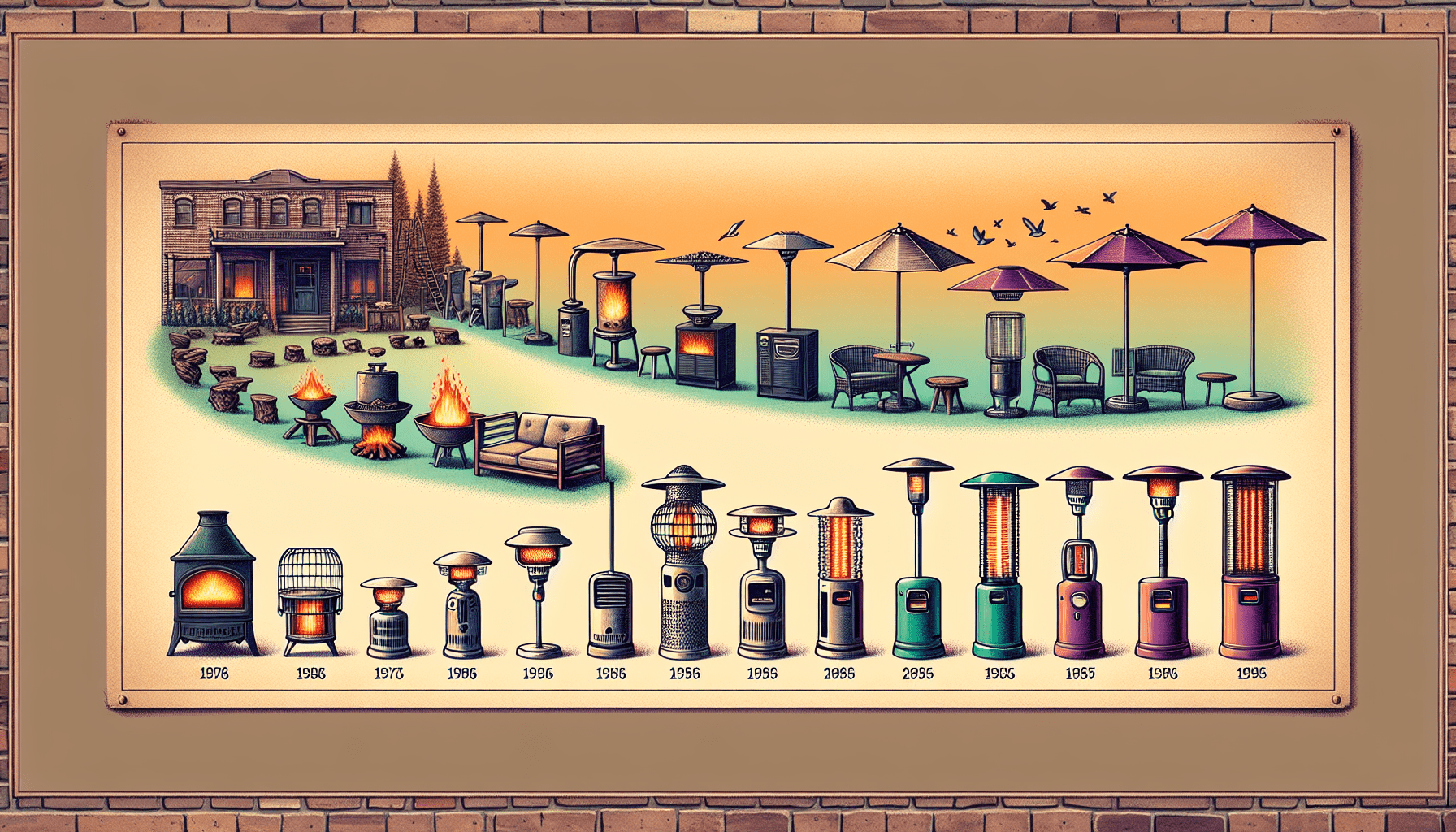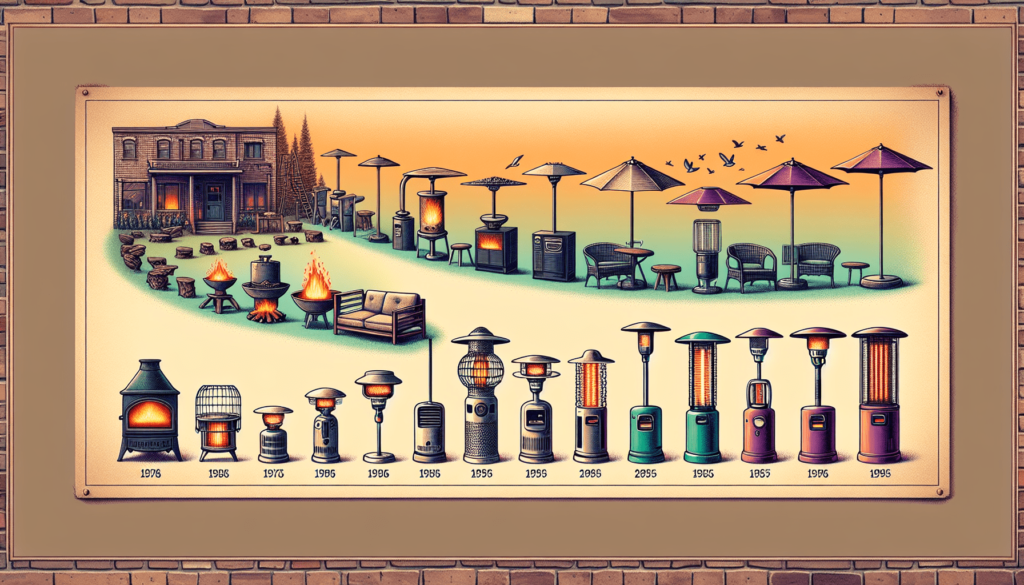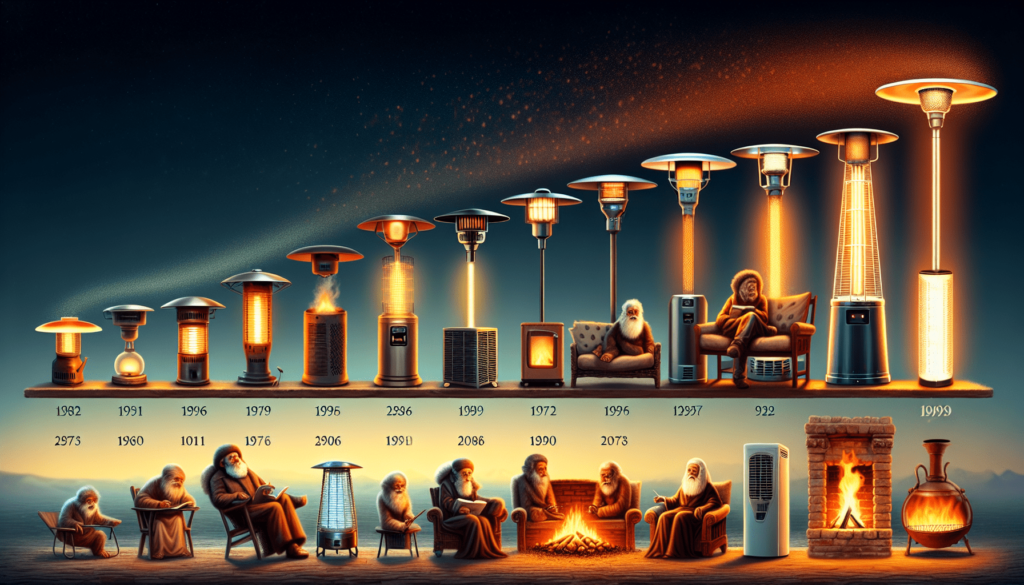
Have you ever wondered how the simple concept of heating an outdoor space evolved into sophisticated modern marvels that allow you to enjoy your patio, no matter the season? Patio heaters have come a long way from their rudimentary beginnings to the sleek, efficient devices we know today. They have transformed the way we use our outdoor spaces, turning chilly nights into warm gatherings and extending the use of patios beyond the traditional summer months.

The Roots of Outdoor Heating: Ancient Times
Outdoor heating has been a necessity and a luxury across various cultures for centuries. Let’s travel back to when the very first concepts of heating a communal space outdoors began.
The Birth of Outdoor Heating with Fire
Since prehistoric times, fire has been integral to human survival, providing warmth and a means to cook food. In many cultures, fire has also been central to social gatherings, rituals, and celebrations. Early humans likely discovered the benefit of gathering around a fire, not only for warmth but for community, sharing stories and preserving traditions.
Using Stones and Brick Ovens
Primitive forms of outdoor heating also included the use of stones. Indigenous cultures often heated stones in a fire and then used these hot rocks to warm spaces or even cook food. Similarly, brick ovens, which have been used for thousands of years, functioned as both cooking tools and sources of heat. These methods allowed people to enjoy warmth beyond the immediate fire itself, a precursor to the more directed forms of heating that would evolve over time.
The Middle Ages to Renaissance: Evolution of Heating Designs
As societies became more sophisticated, so did their methods of heating spaces.
The Rise of Fireplaces and Braziers
During the Middle Ages, castles and manors featured large fireplaces, which served as central heating sources. Meanwhile, portable braziers—metal containers that held burning coal or wood—became popular for outdoor use. These provided a portable source of warmth in courtyards during feasts or gatherings.
Renaissance Innovations
The Renaissance period brought about innovations in architecture and heating. As art and design blossomed, so too did the demand for more aesthetically pleasing forms of heating. Decorative tile surrounds and carved mantels enhanced fireplaces, turning them into a centerpiece of social spaces, both indoors and outdoors.
The Industrial Revolution: Heating Takes a Leap
The Industrial Revolution marked a transformative period in the evolution of heating technologies. As industry tackled the challenge of modern living comforts, new materials and technologies changed everything.
Innovations in Fuel and Design
Coal became a primary fuel source in the 18th century, replacing wood in many instances due to its greater heat output and availability during this era. The Industrial Revolution’s advances facilitated the mass production of heating devices. Notably, cast iron stoves allowed for more efficient burning and distribution of heat, a precursor to future heating devices.
Emergence of Gas Lighting and Heating
In the late 19th century, gas lighting became common, bringing with it the development of gas heaters. This marked the beginning of the transition towards more modern, less labor-intensive heating solutions. The concept of heating spaces with gas laid the groundwork for patio heaters that relied on more controllable fuel sources.
Modern Innovation: The Birth of the Patio Heater
Fast forward to the 20th century, where the need for stylish, efficient, and portable heating became essential for outdoor spaces.
Post-War Design Shifts
In the post-World War II era, social trends shifted towards more outdoor living and entertaining. This spurred innovation in outdoor environmental controls, including heating. The design of patio heaters began to reflect the sleek and modernist aesthetics of the mid-century modern era.
Early Commercial Models
The first commercial patio heaters appeared in the 1960s. These were primarily used by restaurants and businesses looking to extend their outdoor seating seasons. This innovation allowed for increased revenue as establishments could accommodate customers in outdoor spaces further into the cooler months.

The 21st Century: Advancements in Patio Heater Technology
Today, patio heaters are a staple in outdoor living, benefiting from technology that increases efficiency, safety, and flexibility.
| Technology | Description | Benefits |
|---|---|---|
| Infrared Heating | Utilizes electromagnetic waves to heat objects and people directly rather than warming the air. | Efficient for outdoor use, reduces energy loss, and provides instant heat. |
| Propane and Natural Gas Heaters | Incorporate fuel-efficient burners, offering high heat output. | Easy to operate and provide a steady source of heat for extended periods. |
| Electric Heaters | Powered by electricity, these can be safer and more environmentally friendly compared to fuel-based models. | Environmentally friendlier options, suitable for areas with restrictions on fuel burning. |
Eco-friendly Models and Sustainable Practices
The importance of sustainability has driven significant advancements in the design of patio heaters. Manufacturers focus on improving the ecological footprint of these devices, using more sustainable materials and creating designs that are both efficient and less pollutive.
Innovations in Design and Functionality
Modern design trends have pushed manufacturers to create heaters that blend seamlessly with outdoor décor. From sleek, minimalist designs to rustic, vintage-inspired units, there’s a patio heater for every style preference. Moreover, advancements such as smart technology integration allow users to control heaters remotely, adjust temperatures, and set timers, enhancing user experience.
Leading Brands in the Patio Heater Industry
Several brands have established themselves as leaders in the patio heater market, each offering unique solutions that cater to various needs and preferences.
Bromic Heating
Bromic Heating produces some of the most advanced outdoor heating solutions available today. Known for their sleek design and cutting-edge technology, Bromic heaters offer efficient performance with their infrared heating elements, often featured in premium outdoor spaces.
Dyna-Glo
Dyna-Glo stands out for its wide range of affordably priced propane and natural gas heaters. With an emphasis on functionality and reliability, Dyna-Glo models are a favorite choice for residential use, providing robust heat output.
Fire Sense
Fire Sense provides options from electric to gas patio heaters, focusing heavily on design and aesthetic appeal. Many of their products offer easy mobility, allowing users to rearrange outdoor spaces with ease while maintaining efficient heating.
AZ Patio Heaters
AZ Patio Heaters offers a diverse product line catering to different consumer needs with models that vary in function, from tabletop heaters to full-size commercial units. Their appeal is in affordability without sacrificing quality and performance.
The Future of Patio Heaters
As technological advancements continue to evolve, the future of patio heaters looks promising with exciting possibilities in design, energy use, and environmental impact.
Solar-Powered Innovations
With the increasing availability and efficiency of solar panels, integrating solar power into patio heaters presents a promising opportunity. Such innovations could significantly reduce reliance on traditional fuels, offering a sustainable heating method that harnesses renewable energy.
Smart Technology Integration
Future patio heaters will likely see more integration with smart home systems. This could include features like remote control through apps, adjustments based on temperature sensors, and integration with other smart outdoor devices for energy efficiency and convenience.
Environmental Considerations
As awareness grows regarding climate change and environmental impact, the focus for future innovations will likely continue to steer towards sustainable and eco-friendly models. Developing new materials and more efficient designs will help reduce emissions and energy consumption, aligning with global efforts towards sustainability.
Conclusion
The journey from ancient flames to modern patio heaters is a testament to human ingenuity and adaptability. As outdoor spaces become increasingly integral to the home environment, the demand for effective, aesthetic, and environmentally-conscious heating solutions is set to grow. Whether reflecting on our ancestors huddled around a fire or enjoying a brisk evening on a patio warmed by an advanced heater, it’s clear that the need to create warmth and comfort in outdoor settings remains timeless. With continuous improvements and innovations on the horizon, patio heaters will undoubtedly remain a cherished part of our outdoor experiences, making chilly nights cozier and gatherings more enjoyable.




